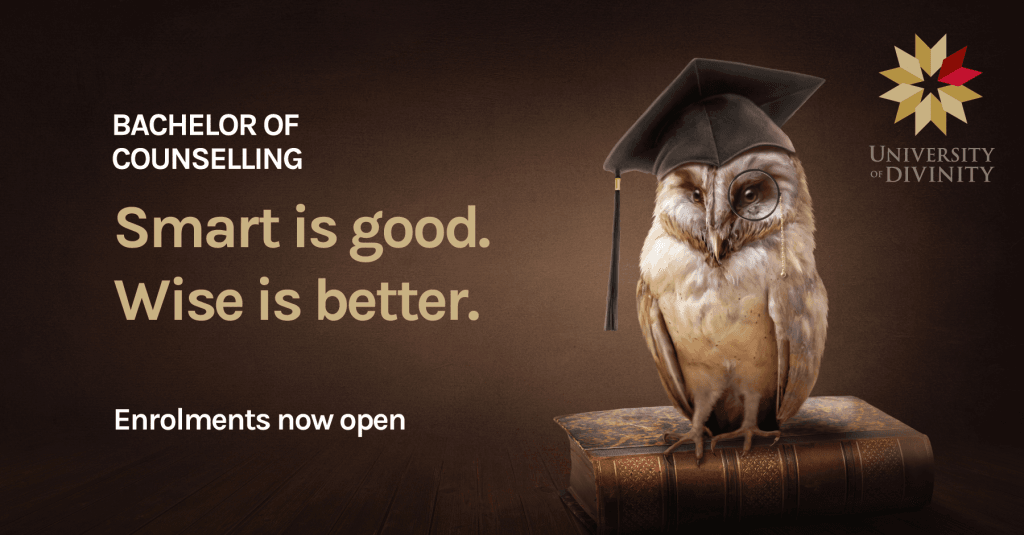Become an insightful practitioner and find ‘the good life’ with us.
At the University of Divinity, in addition to learning the ways of people and training in professional counselling skills, you’ll be equipped for counselling in the mid-21st century. Come and learn about cutting edge topics including the role of artificial intelligence in mental health, and gain basic business skills to prepare you for private practice.
The Counselling Program is offered by the School of Professional Practice.
Going national!
The Bachelor of Counselling is now taught in Sydney, Brisbane, and Melbourne.
Why study Counselling with the University of Divinity?

Leading student experience in Australia
The University of Divinity is nationally recognised as having one of the most positive student experiences of any university in Australia.
Equity based allocation of Commonwealth Supported Places
The University of Divinity has been awarded Commonwealth supported places for the Bachelor of Counselling in 2023 and 2024. Places are allocated on equity to assist students from disadvantaged backgrounds. A Commonwealth supported place (CSP) is a place at a university where the government pays part of your fees. This part is a subsidy, not a loan, and you don’t have to pay it back.
For the purposes of Equity Places, disadvantaged groups include:
- students from low SES backgrounds
- students from inner regional, outer regional, remote and very remote areas
- students who are first in family to study at university
- First Nations students
- students with a disability
The 2024 unit tuition fee for students who are eligible for a commonwealth-supported place is AUD$2,040.00 per unit
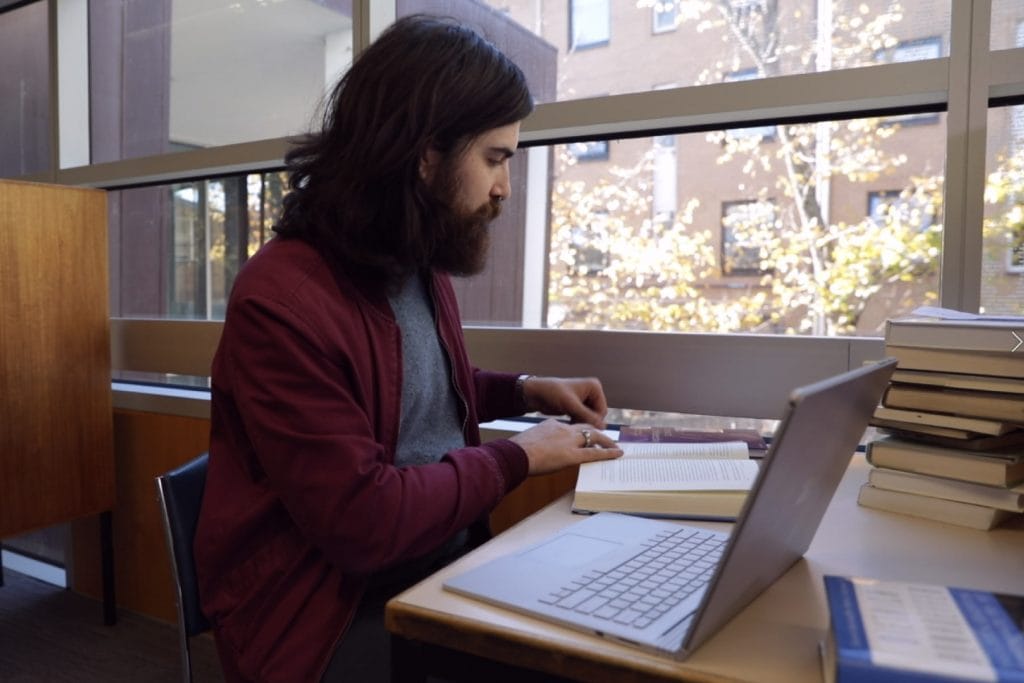

Benefit from a combination of online and on-campus study
Our experience shows that students benefit most from a combination of flexible online learning, and face-to-face learning. In the Bachelor of Counselling all of your units will be blended in some way. A unit of study, for example, may be largely online and require students to meet face-to-face as a class for an intensive. Later in the course you will undertake placements which will require that you counsel clients and seek clinical supervision. This is another form of blended learning.
The benefit of this blended approach is that it provides you with the flexibility you need to learn in a way which suits your lifestyle while acknowledging that counselling is a very human profession requiring that students meet together to practice and refine their skills under the watchful guidance of an experienced practitioner. A good analogy comes from Japanese martial arts. You may practice various skills at home but in the dojo your skills get refined with others under the guidance of a sensei.
A unique approach to counselling training
At the University of Divinity we seek to attract a diverse range of students who can gift insights from their ‘lived experience’ to their classmates and to their clients later on. In fact, a ‘wounded healer’ model of training is often the best as students come with empathy and knowledge that can’t be learnt from textbooks.
Our curriculum is designed to help you find ‘the good life’ and so, in turn, help your future clients to do the same. We therefore don’t just focus on counselling skills but also on virtues such as hope, courage, and compassion. We want you to engage the human condition in all its messiness and beauty.
We also want to meet the challenges of the mid-21st century. You will also learn about Artificial Intelligence in mental health and basic business skills amongst other interesting topics. As a graduate, you’ll be well prepared for the workplace and for future client needs.
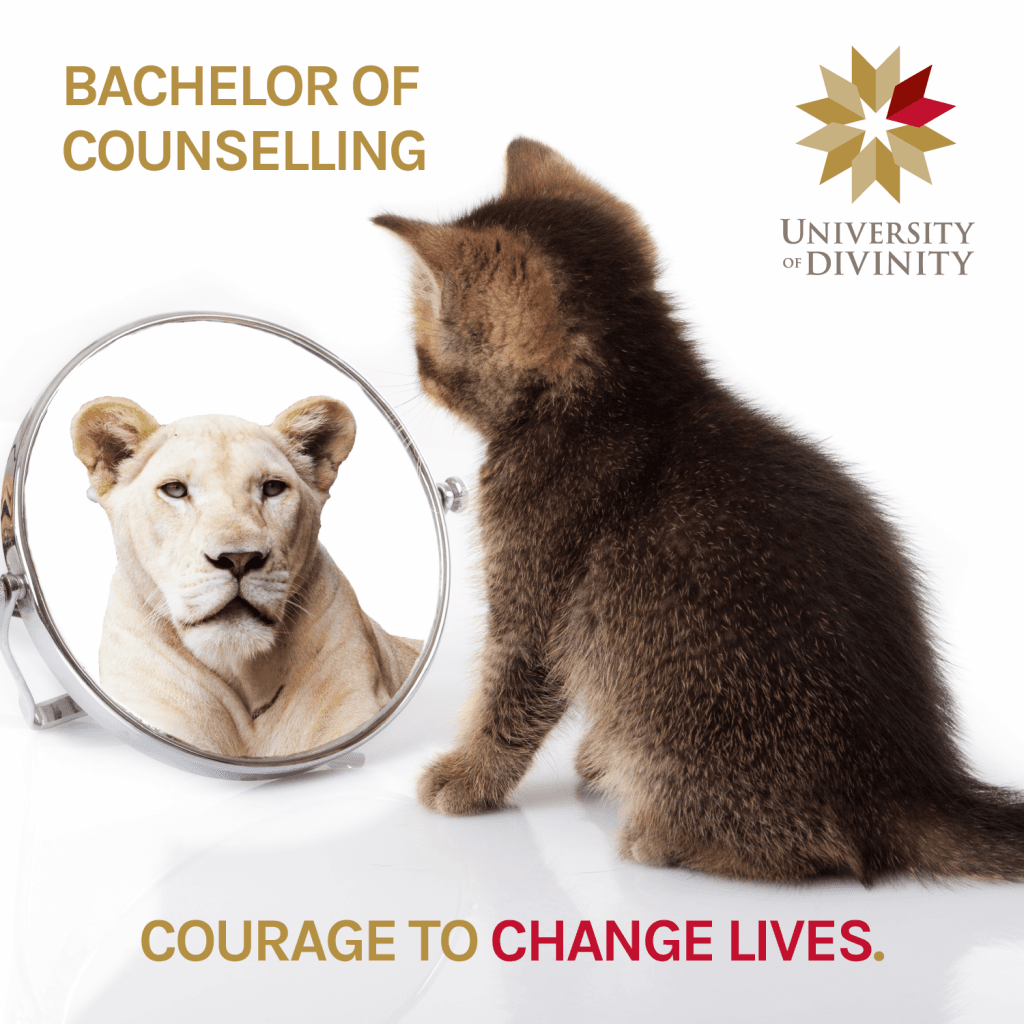
Testimonials
Thank you for having the best teachers to teach us. … The lecturers you chose were such beautiful human beings. Such learned people who taught with so much compassion, patience and understanding it made me feel safe to ask questions… I learned so much from them and they made us feel empowered.
Nancy (1st year student, 2023)
I took the leap of faith to start my Counselling journey with the University of Divinity. My journey has been a bit like a river that ebbs and flows, and has been rocky along the way, but my teachers have always shown me the way forward. I have never regretted my choice to study with the University of Divinity!
Fiona (1st year student, 2023)
Already curious?
Send us a message to register your interest in the course, ask a question, or receive course advice.
Study Information
Locations and Mode
The Bachelor of Counselling is offered by the University’s School of Professional Practice.
All units use blended learning, to enable flexibility around work/life commitments.
Blended learning means a mix of online and face-to-face components.
Learning materials will be available through online modules for students to access at any time 24/7 during the unit.
Seminars are scheduled outside normal working hours to permit flexibility.
Intensives have an experiential focus and are a great way to meet your fellow classmates in person. Intensives are held at hub locations in Melbourne, Sydney and Brisbane.
There are three patterns of delivery for different units:
Pattern 1
- Multi-day in-person intensive (required)
- 7 online modules
Pattern 2
- 8 online modules
- 8 weekly 2-hour online evening seminars (required)
Pattern 3
- Clinical placement with supervision
- Online modules as required
Unit Progression
To complete the Bachelor of Counselling as a full-time student, you will undertake 24 units over a three-year period. The units should be taken in the order provided below. Please contact the Program Director for assistance with (re)enrolments.
Progression Pathway to Assist Enrolment and Re-enrolment
2024 Unit timetable
First year units
| Unit code | Unit name | Term | Unit start date (ARK access is 1 week before) | Unit end date | Intensive dates |
| CO1001Z | Expressing Integrity Through Excellence In Academic And Professional Communication | 1 | Mon 26 Feb | Sun 21 April | Mon 25 and Tues 26 March |
| CO1002Z | Self, Profession and Society | 1 | Mon 26 Feb | Sun 21 April | Wed 27 and Thurs 28 March |
| CO1003Z | Critical Thinking, Problem Solving, And Decision-Making | 2 | Mon 29 April | Sun 23 June | Mon 6 and Tues 7 May |
| CO1004Z | The Human Condition | 2 | Mon 29 April | Sun 23 June | Thurs 9 and Fri 10 May |
| CO1005Z | Introduction to Counselling | 3 | Mon 29 July | Sun 22 Sept | Mon 26 Aug and Tues 27 Aug |
| CO1006Z | Engaging Diversity | 3 | Mon 29 July | Sun 22 Sept | Thurs 29 and Fri 30 Aug |
| CO1007Z | Introduction to psychology | 4 | Mon 30 Sept | Sun 24 Nov | Mon 28 and Tues 29 October |
| CO1008Z | Data literacy for clinicians | 4 | Mon 30 Sept | Sun 24 Nov | Thurs 31 Oct and Fri 1 Nov |
Second year units
| Unit code | Unit name | Term | Unit start date (ARK access is 1 week before) | Unit end date | Intensive dates |
| CO2001Z | Human Development, Personality, And Identity | 1 | Mon 26 Feb | Sun 21 April | Mon 8 and Tues 9 April |
| CO2002Z | Working With Children, Adolescents, And Older Adults | 1 | Mon 26 Feb | Sun 21 April | Thurs 11 and Fri 12 April |
| CO2003Z | Trauma-Informed Counselling In The Context Of Loss and Grief | 2 | Mon 29 April | Sun 23 June | Mon 3 and Tues 4 June |
| CO2004Z | Working In, And With, Culture (Elective) | 2 | Mon 29 April | Sun 23 June | Thurs 6 and Fri 7 June |
| CO2005Z | Working With Couples And Families (Elective) | 2 | Mon 29 April | Sun 23 June | Thurs 6 and Fri 7 June |
| CO2006Z | What Is Abnormal?: The Individual, Diagnostics, And Society | 3 | Mon 29 July | Sun 22 Sept | Mon 2 and Tues 3 Sept |
| CO2007Z | Counselling Ethics, The Law, And Best-Practice | 3 | Mon 29 July | Sun 22 Sept | Thurs 5 Sept and Fri 6 Sept |
| CO2008Z | Self-Care And The Workplace (incl. 36hrs on-job training) | 4 | Mon 30 Sept | Sun 24 Nov | N/A |
| CO2009Z | Strengths-Based Counselling For Marginalised People (Elective) | 4 | Mon 30 Sept | Sun 24 Nov | Thurs 7 and Fri 8 Nov |
| CO2010Z | Counselling Survivors And Perpetrators Of Domestic Violence (Elective) | 4 | Mon 30 Sept | Sun 24 Nov | Thurs 7 and Fri 8 Nov |
Professional accreditation
The Bachelor of Counselling is accredited by the Australian Counselling Association.

The Australian Counselling Association (ACA) is the largest professional association for registered counsellors in the country. Through the ACA members may receive a journal, industry updates, access to local chapter meetings, access to accredited supervisors, and a host of professional development opportunities. Membership also gives clients the peace of mind that their counsellor is acting in accordance with a code of ethics and best practice.
Industry membership

The University of Divinity is a proud sponsor and member of the National Heads of Counselling and Psychotherapy Education network. The network represents Higher Education providers throughout Australia who deliver counselling training.
How to apply
If you have questions about the course, please use the enquiry form on this webpage.
Once you’re ready to apply, fill out the application form. You’ll be contacted to arrange a time for an interview with the Counselling Program Director, Dr Tom Edwards. The purpose of the interview is to ensure that this course is right for you.
Admission Form for Counselling
Email your application form to the School of Professional Practice, at spp-support@divinity.edu.au
Meet our Program Director
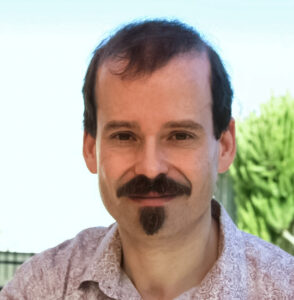
Dr Tom Edwards
School of Professional Practice
Beginning his career in behavioural neuroscience Tom has since shifted his academic interests from the brain to the mind. He is particularly interested in a cluster of virtues which contribute to a cognitive architecture that is evolutionarily consistent and socially relevant. Tom has published in high impact factor journals and spoken at a number of […]
Academic Associates and Consultant Practitioners
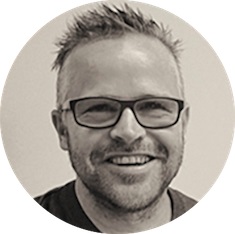
Assoc Prof Matt Sharpe
Counselling
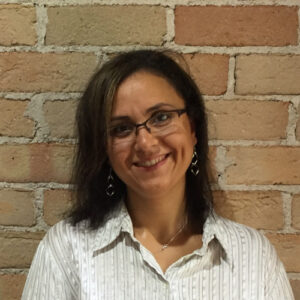
Ireni Farag
St Athanasius College
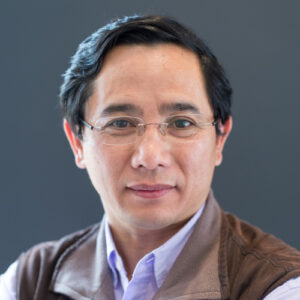
Rev Dr Thien Nguyen
Yarra Theological Union
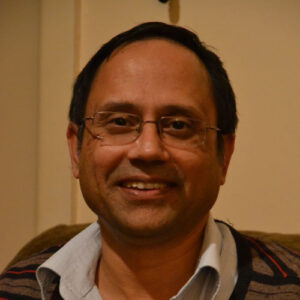
Rev Dr John Martis
Catholic Theological College
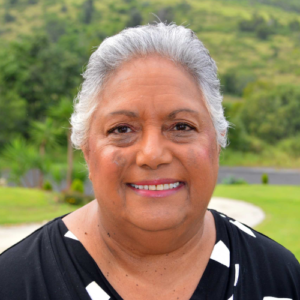
Prof Dr Anne Pattel-Gray
School of Indigenous Studies
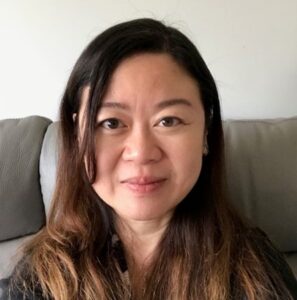
Fiona Lian
Counselling
Support for current students
Email the School of Professional Practice team at spp-support@divinity.edu.au
